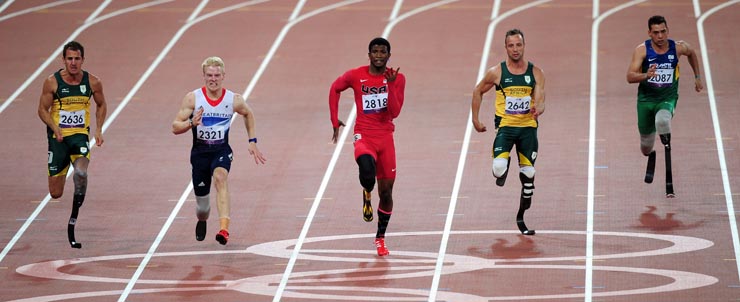Athletics

GB secured two gold medals in Athletics in Beijing, both won by David Weir in the T54 800m and 1500m. Since then, however, the GB team has gone from strength to strength under the careful guidance of head coach Peter Eriksson, who took over in 2009.
At the 2011 IPC World Championships the British team won 38 medals to surpass the previous totals in Assen 2006 and Lille 2002 and finish 2nd overall on the medal table and joint 3rd on the gold medal table. The team also secured five new European records and one world record, from Dan Greaves in the F44 Discus with a throw of 58.98m.
At London 2012, the GB team dominated the track and field, winning 29 medals and finishing third on the medal table - a huge improvement in performance in just four years.

Among the gold medallists, of which there were seven in Athletics for Great Britain, it was David Weir who stole the show winning gold in each of his four events - the T54 5000m, 1500m, 800m and marathon. Also sharing the limelight on the track were Jonnie Peacock, who stormed to victory in the T44 100m, and Hannah Cockroft, who took gold in the T34 100m and 200m. World Champion Richard Whitehead tore apart the field to win gold in the T42 200m, and Mickey Bushell also won gold in the T53 100m.
Among the nine medals won in field events two golds came from Aled Davies in the F42 Discus, two days after he won bronze in the F42 Shot, and Josie Pearson in the F51/52/53 Discus.
- First year at a Paralympic Games:
- Rome 1960
- Brief history:
- Athletics is a traditional Olympic and Paralympic sport and has been on the Paralympic programme since the first Games
- Eligible impairment groups:
- All physical impairment groups and athletes with learning disability. Athletes competing in the track (T) and field (F) events are divided into classifications to ensure fair competition.
- London medal table:
- 1 - China (33 gold, 29 silver, 24 bronze)
2 - Russia (19 gold, 12 silver, five bronze)
3 - Great Britain (11 gold, seven silver, 11 bronze) - GB medals in London:
- David Weir, 4x gold, T54 5000m, 1500m, 800m and marathon
Hannah Cockroft, 2x gold, T34 100m and 200m
Richard Whitehead, gold, T42 200m
Aled Davies, gold, F42 Discus and bronze, F42 Shot
Mickey Bushell, gold, T53 100m
Jonnie Peacock, gold, T44 100m
Josie Pearson, gold, T51/52/53 Discus
Stef Reid, silver, F42/44 Long Jump
Graeme Ballard, silver, T36 100m
Libby Clegg and Mikail Huggins, silver, T12 100m
Paul Blake, silver, T36 400m and bronze, T36 800m
Bethy Woodward, silver, T37 200m
Dan Greaves, silver, F44 Discus
Shelley Woods, silver, T54 marathon
Gemma Prescott, bronze, F31/32/51 Club Throw
Robin Womack, bronze, F54/55/56 Shot
David Devine, 2x bronze, T13 1500m and T12 800m
Olivia Breen, Katrina Hart, Jenny McLoughlin and Bethy Woodward, bronze, T35-38 4x100m Relay
Ben Rushgrove, bronze, T36 200m
Bev Jones, bronze, F37 Discus
Ola Abidogun, bronze, T46 100m - Did you know:
- GB finished 3rd on the medal table at the 2011 IPC World Athletics Championships and the London 2012 Paralympic Games, up from 18th position in Beijing
- London 2012 venue:
- Olympic Stadium
- Rio 2016 venue:
- João Havelange Stadium (Maracaná Zone)
Rules:
In track events, the winner is the fastest athlete to complete the distance of the race. In some field events, however, the athlete who throws the specified item furthest is not always the outright winner as results can be ‘factored’. This means that the results take into account the degree of the impairments of each competitor. After each throw, the athlete secures a number of points based on a combination of the distance and the level of impairment. The gold medal will go to the athlete with the most number of points at the end of the competition.
In ‘combined’ events, where multiple classification groups compete against each other (indicated by the presence of a forwardslash in the event title e.g. F32/51 Discus or F55/56 Discus), athletes break records within their classification group only. Thus in Beijing in the F33/34/52 Discus, two records were broken for two different classifications: British athlete Chris Martin set a Paralympic record for the F33 class and Latvian athlete Aigars Apinis set a world record for the F52 class.
Rules ensure that athletes who have visual impairments can be assisted by guides on the field or the track without giving the athletes any unfair advantages.
All equipment is subject to inspection and stringent rules to ensure competition is fair.
Classification:
In Athletics there are events for all impairment groups. These groups comprise of athletes in classes as follows:
Classes 11, 12 and 13 cover the different levels of visual impairment.
Class 20 covers athletes with a learning disability.
Classes 32-38 cover athletes with different levels of cerebral palsy - both wheelchair users (32 - 34) and those who are ambulant (35 - 38).
Classes 40-46 cover ambulant athletes with different levels of amputations and other impairments, including les Autres (e.g. athletes who have dwarfism).
Classes 51-58 cover athletes with different levels of spinal injuries and amputations who compete in wheelchairs.



Comments
The BPA would like to see lots of people engaging with the news and information that we post on our website. If you would like to participate in the conversation, however, please ensure you comply with the House Rules. The BPA reserves the right to remove posts which do not comply with these Rules or which are considered irrelevant to the post.